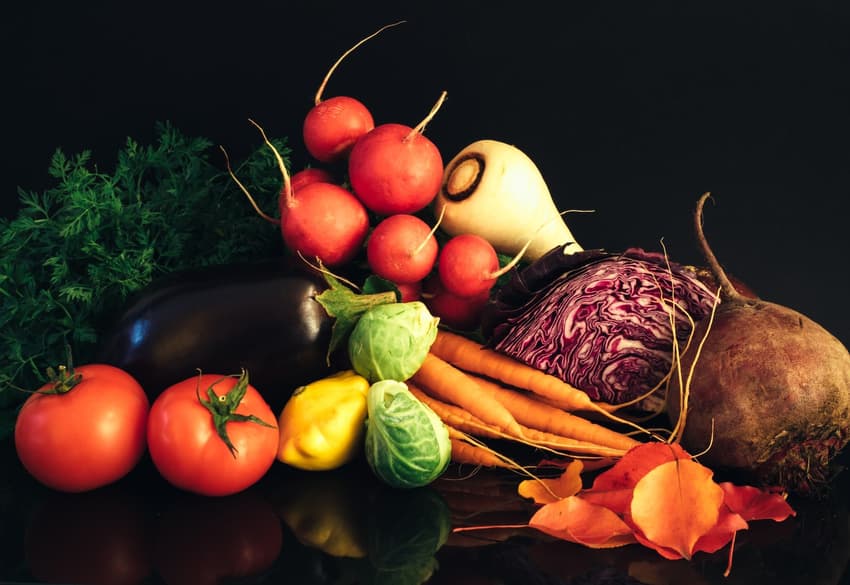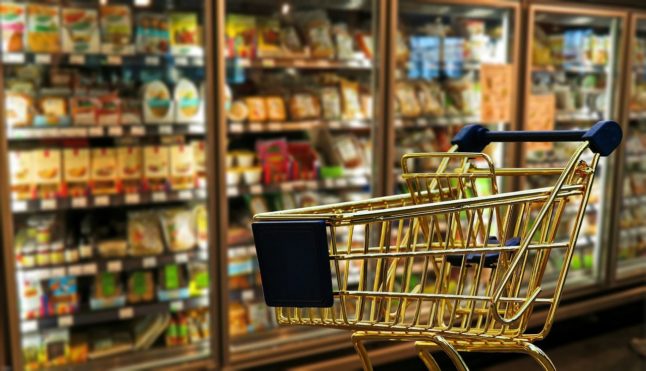EXPLAINED: 8 ways to save money on your groceries in Switzerland

With the cost of living going up, many of us are thinking of ways to spend a little less. Here are some tips on how you can save money when grocery shopping in Switzerland.
Think about the supermarket where you shop
A lot of the time, food items cost a similar amount in different shops. But there are many items that are available at much lower prices than the competition. Discounters like Denner, Aldi and Lidl offer some products at a much cheaper price than the two largest retailers Coop and Migros. You can check out the articles below to compare prices.
READ ALSO:
- Migros versus Coop: Which Swiss supermarket has cheaper groceries?
- Aldi vs Lidl - which retailer is cheaper?
Buy products in season
Purchasing fruit and vegetables is less expensive when they are in season. That's because the products don't have to be kept in cold storage in the same way, which thanks to the current high energy prices incurs high costs that are then passed onto the customer. So going for produce that is naturally abundant at the time of year can really pay off.
At the moment, vegetables such as kale, pumpkins, squashes, leaks and cabbages are in season, but you can refer to an online Saisonkalendar (season calendar), such as this one, to keep an eye on which fruits and veggies are in season at different times of the year.
Opt for cheaper products
Instead of entrecôte or fillet of beef, try a cervelat or minced meat. Vegetables are also cheaper than meat, so you could go for more 'meat-free' days.
You can also save by buying low-price or own-brand products (for example, Prix Garantie from Coop or M-Budget from Migros). For some items, the price differences between cheap products, own brands and brand-name products are small, but for others they are bigger.
READ MORE: Pasta up by 13 percent: How food and energy prices in Switzerland are rising

Many common products are now more expensive. Image by Alexa from Pixabay
Look out for discount stickers and special offers
Discount stickers are an easy way to save money when shopping for groceries in Switzerland. All the major retailers like Migros, Coop, Denner, Aldi Suisse and Lidl reduce the prices of many food products shortly before their expiry date. The discounts are marked on the products (usually with a red or orange sticker) and often range from 25 to 50 percent below the retail price.
When picking up discounts, you need to be flexible. You won't know which items are discounted before you go on your shopping spree. Usually, the evening shortly before closing time, and weekends are the best time to go bargain hunting. And keep an eye out for special offers. Customers can find out about weekly promotions in the Migros magazine, in the Coop newspaper and in the brochures of Denner, Aldi and Lidl, as well as online.
Collect loyalty points
Many large Swiss food retailers have customer loyalty programmes. The most popular are Cumulus (Migros, Voi, Migrolino) and Supercard (Coop).
The two programmes work similarly: show your customer card or the app at the checkout. As a rule, you get one point for every franc spent. With Migros, you receive vouchers every three months that you can use like cash in Migros shops. At Coop, the points are automatically credited to your points account. You can use these points to pay for certain products as part of promotions. You can also pay for your purchases with points at the Coop City department stores' (without the food department).
100 points correspond to one franc with both Cumulus and Supercard. This means that you normally have to spend 100 francs to get the equivalent of one franc. Get collecting.
READ MORE: Cost of living: How you can beat Switzerland’s inflation blues?

Photo by Bozhin Karaivanov on Unsplash
Keep an eye on coupons
Collecting coupons is a bit like playing the lottery. Sometimes the coupons match the groceries on your shopping list, sometimes they don't. With the right coupons, you can get discounts of up to 50 percent. Checking out customer magazines like the Coop paper and regional newspapers can be worthwhile. You can also find coupons in the apps of supermarkets like Migros, Coop and Lidl. And sometimes the coupons are even available in the shop itself. If you buy groceries online, you can often find coupons for online grocery shops and delivery services on numerous discount sites.
But don't be blinded by the coupons: they are often branded products that are much more expensive than other items in the same shop, despite the discount.
Try shopping at farms
Wherever you live in Switzerland, chances are high that there is a farm fairly nearby (or it may make a nice day trip on the weekend). Some farmers sell their fresh produce directly from stalls, and the fruit and vegetables can be cheaper than in the supermarket.
Some farms in Switzerland are open around the clock. Money can usually be deposited in a cash box. Often payment via Twint is also possible. On schweizerbauer.ch you can find a list of Swiss farms by location. Although you can also buy regional products from farms on online platforms. However, the same savings are often not possible there as when you buy directly from a farm.
Fight food waste - and save money
Some organisations who want to reduce food waste sell almost expired food in Switzerland at a good price. Plus, retailers sometimes reject products simply because they are not in the desired shape, for example (such as crooked carrots).
The app Too Good To Go is well known. Customers use this smartphone app to buy a surprise package of leftover food. At the time specified in the app, you pick up the package. Various supermarkets, as well as restaurants, bakeries and takeaways are on board with the app. Food-waste shops like the Äss Bar shops, which sell baked goods from the day before, aim to reduce food waste rather than cost, but the prices are still far below the retail price.
If you are affected by poverty, you can also go shopping at Caritas grocery shops. Everyday products are usually available at much lower prices than in conventional supermarkets. The prerequisite is that you are on or below the poverty line, receiving economic social assistance or supplementary benefits to social security, or are in debt. There are also some local projects and food banks where people in poverty can buy cheap products - or even get them for free.
Comments
See Also
Think about the supermarket where you shop
A lot of the time, food items cost a similar amount in different shops. But there are many items that are available at much lower prices than the competition. Discounters like Denner, Aldi and Lidl offer some products at a much cheaper price than the two largest retailers Coop and Migros. You can check out the articles below to compare prices.
READ ALSO:
- Migros versus Coop: Which Swiss supermarket has cheaper groceries?
- Aldi vs Lidl - which retailer is cheaper?
Buy products in season
Purchasing fruit and vegetables is less expensive when they are in season. That's because the products don't have to be kept in cold storage in the same way, which thanks to the current high energy prices incurs high costs that are then passed onto the customer. So going for produce that is naturally abundant at the time of year can really pay off.
At the moment, vegetables such as kale, pumpkins, squashes, leaks and cabbages are in season, but you can refer to an online Saisonkalendar (season calendar), such as this one, to keep an eye on which fruits and veggies are in season at different times of the year.
Opt for cheaper products
Instead of entrecôte or fillet of beef, try a cervelat or minced meat. Vegetables are also cheaper than meat, so you could go for more 'meat-free' days.
You can also save by buying low-price or own-brand products (for example, Prix Garantie from Coop or M-Budget from Migros). For some items, the price differences between cheap products, own brands and brand-name products are small, but for others they are bigger.
READ MORE: Pasta up by 13 percent: How food and energy prices in Switzerland are rising

Look out for discount stickers and special offers
Discount stickers are an easy way to save money when shopping for groceries in Switzerland. All the major retailers like Migros, Coop, Denner, Aldi Suisse and Lidl reduce the prices of many food products shortly before their expiry date. The discounts are marked on the products (usually with a red or orange sticker) and often range from 25 to 50 percent below the retail price.
When picking up discounts, you need to be flexible. You won't know which items are discounted before you go on your shopping spree. Usually, the evening shortly before closing time, and weekends are the best time to go bargain hunting. And keep an eye out for special offers. Customers can find out about weekly promotions in the Migros magazine, in the Coop newspaper and in the brochures of Denner, Aldi and Lidl, as well as online.
Collect loyalty points
Many large Swiss food retailers have customer loyalty programmes. The most popular are Cumulus (Migros, Voi, Migrolino) and Supercard (Coop).
The two programmes work similarly: show your customer card or the app at the checkout. As a rule, you get one point for every franc spent. With Migros, you receive vouchers every three months that you can use like cash in Migros shops. At Coop, the points are automatically credited to your points account. You can use these points to pay for certain products as part of promotions. You can also pay for your purchases with points at the Coop City department stores' (without the food department).
100 points correspond to one franc with both Cumulus and Supercard. This means that you normally have to spend 100 francs to get the equivalent of one franc. Get collecting.
READ MORE: Cost of living: How you can beat Switzerland’s inflation blues?

Keep an eye on coupons
Collecting coupons is a bit like playing the lottery. Sometimes the coupons match the groceries on your shopping list, sometimes they don't. With the right coupons, you can get discounts of up to 50 percent. Checking out customer magazines like the Coop paper and regional newspapers can be worthwhile. You can also find coupons in the apps of supermarkets like Migros, Coop and Lidl. And sometimes the coupons are even available in the shop itself. If you buy groceries online, you can often find coupons for online grocery shops and delivery services on numerous discount sites.
But don't be blinded by the coupons: they are often branded products that are much more expensive than other items in the same shop, despite the discount.
Try shopping at farms
Wherever you live in Switzerland, chances are high that there is a farm fairly nearby (or it may make a nice day trip on the weekend). Some farmers sell their fresh produce directly from stalls, and the fruit and vegetables can be cheaper than in the supermarket.
Some farms in Switzerland are open around the clock. Money can usually be deposited in a cash box. Often payment via Twint is also possible. On schweizerbauer.ch you can find a list of Swiss farms by location. Although you can also buy regional products from farms on online platforms. However, the same savings are often not possible there as when you buy directly from a farm.
Fight food waste - and save money
Some organisations who want to reduce food waste sell almost expired food in Switzerland at a good price. Plus, retailers sometimes reject products simply because they are not in the desired shape, for example (such as crooked carrots).
The app Too Good To Go is well known. Customers use this smartphone app to buy a surprise package of leftover food. At the time specified in the app, you pick up the package. Various supermarkets, as well as restaurants, bakeries and takeaways are on board with the app. Food-waste shops like the Äss Bar shops, which sell baked goods from the day before, aim to reduce food waste rather than cost, but the prices are still far below the retail price.
If you are affected by poverty, you can also go shopping at Caritas grocery shops. Everyday products are usually available at much lower prices than in conventional supermarkets. The prerequisite is that you are on or below the poverty line, receiving economic social assistance or supplementary benefits to social security, or are in debt. There are also some local projects and food banks where people in poverty can buy cheap products - or even get them for free.
Join the conversation in our comments section below. Share your own views and experience and if you have a question or suggestion for our journalists then email us at [email protected].
Please keep comments civil, constructive and on topic – and make sure to read our terms of use before getting involved.
Please log in here to leave a comment.